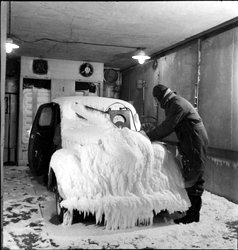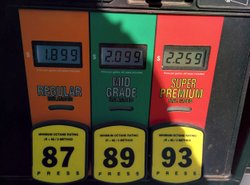Common MPG Myths Taken To Task
It is clear that gas mileage can be improved through good driving practices, tire maintenance and by following service schedules. However, according to different sources and articles on the internet, there are several other things which are rumored to improve gas mileage, but do not seem to work on today’s cars. Some of these myths, such as preferring air conditioners to open windows and selecting tires with low rolling resistance, do not affect gas mileage. Here are several common mpg myths.
Warming Up the Engine before Driving

If you used to be a car owner during the 80s and 90s, then you will remember that there were days that you had to get into your car and start it first for some time before driving the vehicle so that you could get the engine’s temperature up. Those were the days before the advanced synthetic oils, electronically controlled engines and fuel injected engines were invented. Recent research indicates cold engine wear is a thing of the past, thanks to the cleverly designed engine systems that were designed to get your engine up to the operating temperatures within a very short time.
Cheap Gas Stations Offer Cheap Gas
For many years there has been a common belief among car drivers that gas purchased at independent gas stations is not of the same quality as the gas that has been purchased from branded gas stations. You may have even heard rumors, especially in the past, saying that there are several gas stations that dilute gasoline with small amounts of water, thereby affecting engine and power efficiency. In reality, every gas station is tied down by tight laws, while the independent and unnamed gas stations normally purchase gasoline from well-established gas companies. The only difference between cheaper gasoline and expensive gasoline is that majority of the cheaper gasoline tends to omit the additives that were specifically designed to clean the older engines. With the modern fuel injection system, this should not make much of a difference.
As an alternative to traditional gas stations, you can also try bulk gasoline delivery as it eliminates the need for frequent trips to the pump. Delivery in bulk allows car owners to get larger quantities of gasoline delivered directly to their homes or places of business. This saves a lot of time and money because you don’t have to make multiple stops at different locations.
Premium Gasoline Tends to Give Better Gas Mileage

Because premium gasoline has a higher octane rating when compared to regular or midgrade gas, it tends to produce a little bit power when it is burnt. Designed for high-performance cars with exceedingly powerful and large engines, premium gas plays a key role in the minimization of the risk involved with preignition inside highly stressed engine cylinders. On a track, this extra boost offered by premium gasoline can mean a difference of few tenths of seconds. Recent research indicates, the extra boost barely affects fuel economy or performance.
Open Windows Tends to Kill Fuel Efficiency
Air conditioning or windows? It is a very common misconception that winding down the windows on your car to offer ventilation tends to create an extra drag and gas mileage will fall further than it would especially when using air conditioning. Keeping the open windows when driving does not in any way affect the gas mileage.
Low Resistance Tires Are the Best
Car tires that are exclusively designed to lower the rolling resistance may save the user a few mpg when properly maintained and inflated. But according to research, better

driver habits and tire maintenance can effortlessly make up for the difference between a regular tire and an energy saver tire. It is also clear that lower rolling resistance tires will always perform poorly in icy and wet conditions compared with regular tires, thereby increasing the risk of an accident. The solution to this is to look for a great all-round tire that combines good tire life, fuel efficiency and good grip.
Dirty Air Filters Tends to Kill the Gas Mileage
Just like the case with warming up the vehicle, dirty air filters do have an impact on gas mileage, especially on the older vehicles. However, computer software and air flow sensors carefully manage the fuel/air mix in modern engines, thereby ensuring the maximum fuel economy possible, irrespective of the air quality. The only difference will be on the performance. If the air filter is dirty, then less air is going to get inside the engine under hard acceleration, meaning that the car will speed up more slowly.
As it has been proven, gas mileage is not affected by the numerous tricks and tips that you may find floating all over the internet. Sadly enough, the mileage that you will get out of your car will be more dependent on the driver more than anything else. Always try and keep calm when driving, ensure that you are in top form before driving, and always remember to look ahead.
